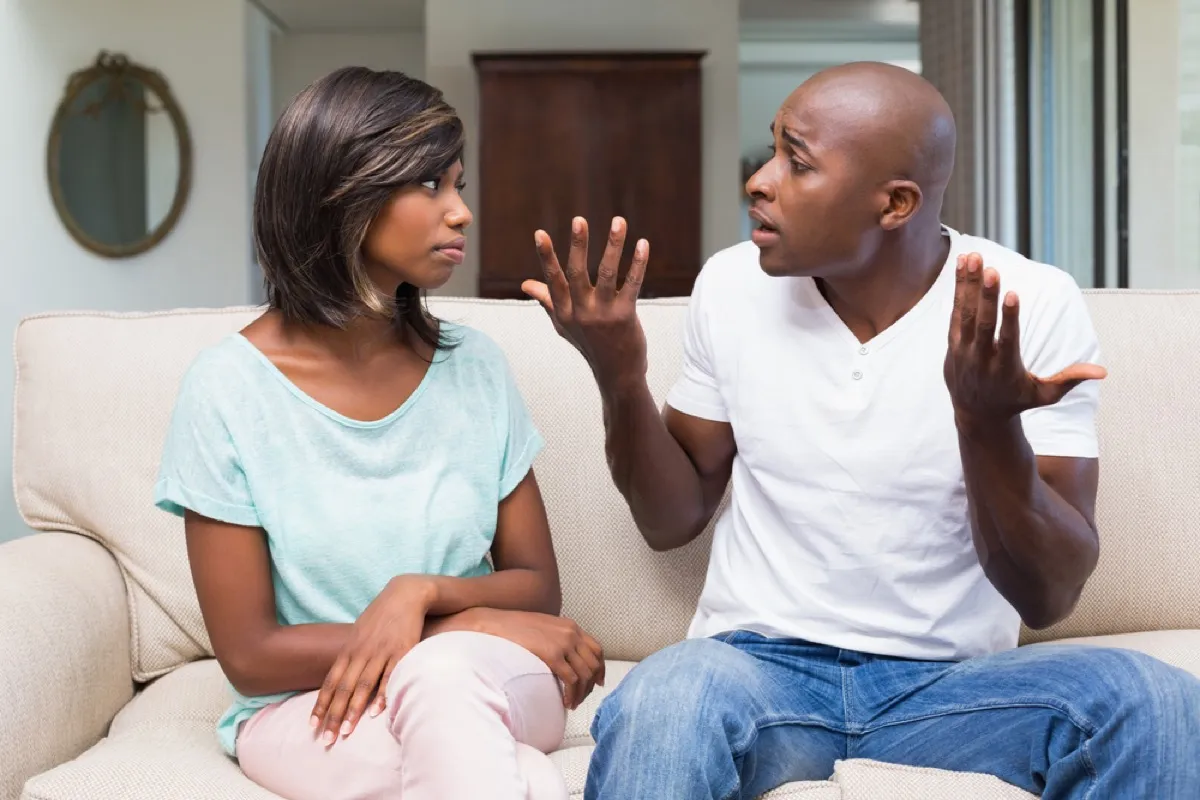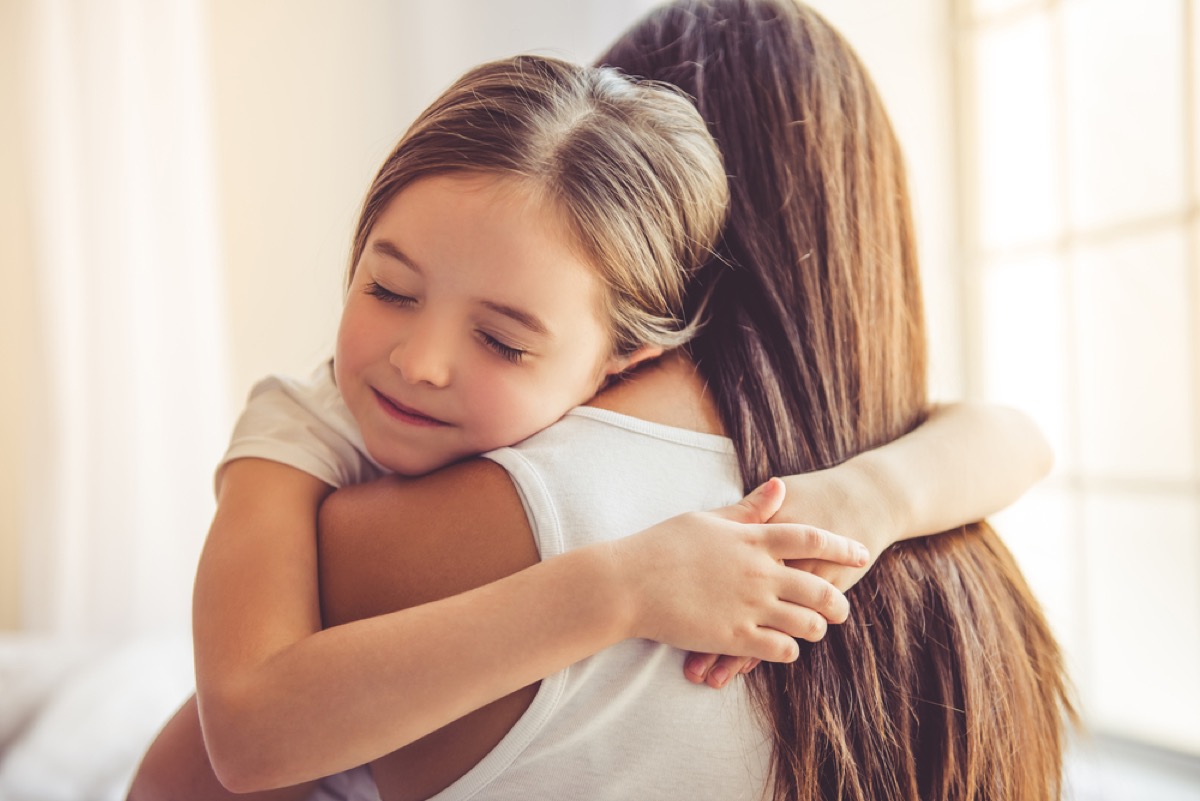33 Important Ways to Prepare Your Children for Divorce

Whether you’ve been together five years or 50, getting a divorce is rarely painless—and when there are children involved, it’s significantly more complicated. Between making custody arrangements, figuring out how to divvy the kids’ stuff up between your two homes, and worrying about the he-said-she-said, the process is bound to be tough on everyone involved.
However, with adequate planning, you can handle your divorce in a way that doesn’t have to feel like your kids’ world is crashing down on them. Sure, it won’t be easy, but these 33 tips from leading divorce experts can make that split easier on your kids—and on you, in the long run.
1
Make the announcement once the wheels are already in motion.

One mistake many divorcing parents make is telling their kids about their intention to divorce long before the ball is actually rolling. David Reischer, Esq., a family law attorney in New York City and CEO of LegalAdvice.com, says that if parents have a change of heart, it can ultimately be damaging for children, noting “people do frequently change their mind.”
2
Make sure you and your ex are on the same page before delivering the news.

Before you decide to break the news to your kids, get on the same page about the exact language you’ll use to tell them what’s happening. “Strive to have an agreement with your partner on how the situation will be handled,” says clinical psychologist Dr. Carla Marie Manly, author of Aging Joyfully. “Children do far better with the news of divorce when parents are positive and aligned.”
3
Schedule an appropriate time to deliver the news.

Before you break the news to your kids, set a specific fitting time and place to do so. Therapist Raffi Bilek, LCSW-C, director of the Baltimore Therapy Center, suggests finding a time when stress is low and nobody has plans for at least a few hours. As Bilek points out, making the announcement and then sending kids to school, for example, might make it impossible for them to concentrate.
4
Limit distractions when telling them about the divorce.

Taking your kids to Disney World to break the news might seem like a great way to cushion the blow, but being on your home turf will actually work better for everyone involved. Instead, “ensure that they are in a quiet, safe space such as their backyard, living room, or another serene setting that is free of distractions,” says Manly. And to make sure the message is getting through without any confusion, ask everyone to put their devices down during the conversation.
5
Make it clear that they’re in no way responsible for what’s happening.

Though repeating “it’s not your fault” over and over may seem cliché, Manly says it’s important to reiterate the fact that your kids have nothing to do with your decision to split. Instead, make sure they know that your decision is “strictly about two adults needing to be apart due to differences.”
6
Don’t assume you know how your kids will respond.

While you might assume that your children will feel hurt, angry, or confused about the news of your divorce, make space for them to have and express their own feelings about it.
If they’re angry instead of sad, or seem unemotional, don’t push them to mimic your own response to the changes in the family. According to Grady Sullivan of the Parenting Through Divorce program in Kansas City, Missouri, it’s important to realize that “children may be experiencing a completely different emotional response than you.”
7
Ask your child how they’re feeling after you’ve made the announcement.

The best way to figure out how your kids are feeling about your divorce is simple: just ask. Sullivan suggests that parents ask how their kids feel about specific changes in the family structure, like who will live where, or what the divorce means for special occasions in the future.
8
Accept that the divorce itself may not be the hardest thing for them.

It’s easy to assume that the idea of their parents splitting up may be the hardest part of the process for your kids. But let them tell you what they’re most worried about instead of projecting. Since the concept of divorce is hard for younger kids to fully grasp, they might have different concerns that are just as valid, like about who will be picking them up from school, where their stuffed animals will live, or how close they’ll be living to their friends.
9
Have a therapist on call.

Before you announce your split to your kids, line up a therapist, suggests psychiatrist Carole Lieberman, M.D. Providing your kids with neutral ground to express their feelings—without the fear of judgment or causing hurt to the involved parties—can help them process some of the big emotions they’re going through.
10
And hire a mediator.

Having a mediator on hand before you make the announcement can make all the difference in terms of how the situation plays out for your kids. “Attorneys are there to fight for your rights and this doesn’t always line up with what is in the best interest of your children—or you for that matter,” says Paige Harley, a trauma trained mediator, certified parent coordinator, and traumatic stress certified divorce transition coach based in the Nashville, Tennessee area.
11
Make scheduling your top priority.

Of course, splitting custody or divvying up finances are the more pressing issues for you and your ex, but for little kids who don’t necessarily understand the ins and outs of those decisions, a lack of clarity about scheduling can often prompt more stress—which is why it’s important to tackle that first.
“Resolving the issues regarding the children’s schedule should be any parent’s first priority,” says Florida-based divorce attorney Russell D. Knight. “The money issues will still be waiting for you once the children’s schedule is done.”
12
Be expressive about your feelings toward them.

If you’re worried that being lovey-dovey with your kids during a divorce will put additional stress on them, don’t be—it’s an important time to reiterate how much they mean to you and that neither you nor your ex will ever feel differently about them.
If you want to give them a sense of security, “communicate that both parents love them no matter what the outcome” of the divorce process, suggests marriage counselor Dr. Tim Barron LPCC-S, of Cincinnati, Ohio.
13
Tell them they don’t have to pick a parent.

Many kids feel pressured to show their allegiance to one parent or the other—particularly in the case of contentious divorces—so it’s important to make it clear to them that that’s not necessary. To help mitigate the issue, parents should “reassure them that they will get to see both parents and that they do not have to ‘take sides,’” says Barron.
14
Explain exactly what will change from day to day.

Instead of springing major changes, like holidays in new homes or separate birthday celebrations, on your kids, tell them exactly what’s staying the same and what’s different. Barron suggests communicating the specific day-to-day changes in their routine and keeping an ongoing dialogue about these shifts.
15
Give them a play-by-play of your next steps.

“Seeing a packed suitcase at the front door before finding out that your parents are separating creates shock for a child, which becomes part of the trauma of divorce,” says Adina Mahalli, MSW, a certified mental health consultant and family care specialist from Toronto, Canada. To help minimize that shock and trauma, give your kids a play-by-play of how the weeks and months following the announcement will shake out, from when movers will be coming to get stuff to when they’ll spend their first night in a new house.
16
Make it clear both parents are still on the same team.

While some kids will act like parents are dueling factions following a split, making it clear that you’re a unified front early on in the process will make things easier on everyone involved. It’s important they know that “mom and dad are on the same team and cannot be pitted against each other” before they attempt to take advantage of the situation, says Tara Eisenhard, a divorce coach and mediator in Harrisburg, Pennsylvania, and author of The D-Word: Divorce Through a Child’s Eyes.
17
Hold regular family meetings about the divorce.

Don’t let the announcement of your divorce be the last time you talk about the process with your kids as a family. Eisenhard recommends holding regular family meetings to provide children a space to discuss their feelings and concerns. “This keeps the family bonded and gives all family members valuable insight to help determine how to keep moving forward in the most appropriate way possible,” she says.
18
Make any changes to your family’s finances clear before they happen.

Failing to be forthcoming about financial changes can eventually trap parents into spending patterns they can no longer afford to maintain, necessitating bigger, often drastic changes in a kid’s life, instead of ones they know to anticipate.
“Selling the home, changing schools, cutting out camp, and downgrading or eliminating vacations need to be explained to the children ahead of time,” says Lou Cannataro, ChFC, REBC, AEP, CASL, CLU, president of Cannataro Park Avenue Financial in New York City.
19
If a parent is returning to work, break the news early.

Divorce frequently means a parent who previously stayed home has to return to work. If this is the case, “just state it matter-of-factly,” says Harley.
“Do not complain to your child or be unkind to the other parent whether it’s your choice or not.” Instead, let them express their concerns about these changes and let them know how this will change their schedule as soon as you possibly can.
20
Refuse to lay blame.

Even if there has been serious hostility or infidelity, those details don’t need to be communicated to your kids when making the announcement. What’s better, in the long run, is to “be as objective as possible without blaming either party,” says Bilek.
21
Make a pact to avoid talking negatively about each other.

As hard as it may be, especially in the case of an acrimonious split, Lieberman says talking negatively about one parent in front of the kids will only cause harm in the long run. So, make it clear to your soon-to-be ex that there will be no hurtful remarks about the other parent when you have your children with you.
22
Allow your kids to check out their new rooms before any moves.

One of the biggest stressors about divorces for kids is the idea of sleeping somewhere new. To help them work through this, Barron suggests providing ample detail about where they’ll be staying, when, and what the new space is like. Show them pictures of the new house, talk to them about their new bedroom, and make the change seem exciting, not scary.
23
Let kids have a voice about what stays and what goes.

Instead of moving everything for your kids and showing them a fully-furnished room, let them choose what they’re moving to the new house, suggests Harley. While it may feel like a personal loss when you see them taking their beloved possessions from your home, doing so gives them a sense of control over a situation that’s otherwise largely out of their hands.
24
Put up a photo of your child and their other parent in their new room.

To make your kid’s new room complete, “a photo of your child and the other parent in their room is a great idea,” says Harley. “It sends a strong positive message, which is: I support you loving your other parent!” However, she cautions against putting up a photo of the whole family, as it may give your child false hope about a reconciliation.
25
Take them “new house” shopping.

Getting your kids a few new things for their new room can make it feel like a special experience instead of a scary one. A new set of sheets, a new stuffed animal, or just a cool poster for their wall can make all the difference when it comes to seeing the space as home.
26
But don’t go overboard with presents.

While buying a few new things for your kid’s new room can make them feel at home, Harley warns against doing too much at once. “Don’t give in to the temptation of not saying no when you know you should,” she cautions.
27
Schedule playdates at your ex’s house.

If you want to make your kids’ new house seem as special as their old one, set up some playdates with their friends in the new space. In doing so, you’ll help assuage any fears about them having to miss out on time with their friends on the days they spend with one parent or the other—something that can quickly sour a kid on their new arrangement.
28
Ask your kids if they are hoping you’ll get back together.

Movies and TV shows make it seem as though divorced parents can be easily persuaded to reconcile, but it’s important to make sure your kids have realistic expectations about the future of your relationship going into the divorce.
Instead of letting those wishes go unexpressed, “ask your kids if they ever fantasize about your getting back with your former spouse,” suggests Harley. This opens the door to a conversation they might otherwise feel embarrassed or uncomfortable having and provides an opportunity for you to address their potentially unrealistic expectations.
29
Discuss dating as an abstract concept before it becomes a reality.

Before you actually start thinking of yourself as a single person again, “talk about dating before [you] start to date,” says Harley. Discussing the fact that you might, at some point, start seeing new people, can make it easier for your kids to come to grips with the idea before it becomes a reality.
30
Explain that liking a parent’s new partner isn’t a betrayal.

It’s also important to make it clear to your children that liking a new significant other doesn’t mean they’re betraying you. Make it known that they can talk to you about your ex’s new partner without it becoming an emotional issue for you.
31
Make sure the solo time you have together is focused exclusively on them.

If you’re suddenly finding yourself parenting your kids solo for the first time, give them your undivided attention on the days you have them. “You get to start fresh!” says Harley, who recommends taking this time to really get to know your kids one-on-one.
32
Let them know that family time is still on the table.

Just because you and your former spouse won’t be together as a couple doesn’t mean that your kids won’t ever see you in the same room again. Arranging activities where you can still spend time together as a family can make the transition easier—just make it clear that your ability to be friends with your ex isn’t an indication that you’ll eventually rekindle your romantic relationship.
33
Let them know you’ll always be a family.

Divorce may mean that your kids have two bedrooms, two holiday celebrations, and maybe even stepparents in the picture eventually, but it’s important to let them know that your divorce doesn’t make you any less of a family. Make it clear that, no matter what changes, they remain the top priority for both you and your ex, and that your parent-child bond—and your love for them—will never change. And to get yourself ready for your split, make sure you know the 40 Best Ways to Prepare for Divorce.
To discover more amazing secrets about living your best life, click here to follow us on Instagram!